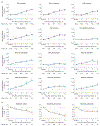An electronic health records study of long-term weight gain following antidepressant use
- PMID: 24898363
- PMCID: PMC9980723
- DOI: 10.1001/jamapsychiatry.2014.414
An electronic health records study of long-term weight gain following antidepressant use
Abstract
Importance: Short-term studies suggest antidepressants are associated with modest weight gain but little is known about longer-term effects and differences between individual medications in general clinical populations.
Objective: To estimate weight gain associated with specific antidepressants over the 12 months following initial prescription in a large and diverse clinical population.
Design, setting, and participants: We identified 22,610 adult patients who began receiving a medication of interest with available weight data in a large New England health care system, including 2 academic medical centers and affiliated outpatient primary and specialty care clinics. We used electronic health records to extract prescribing data and recorded weights for any patient with an index antidepressant prescription including amitriptyline hydrochloride, bupropion hydrochloride, citalopram hydrobromide, duloxetine hydrochloride, escitalopram oxalate, fluoxetine hydrochloride, mirtazapine, nortriptyline hydrochloride, paroxetine hydrochloride, venlafaxine hydrochloride, and sertraline hydrochloride. As measures of assay sensitivity, additional index prescriptions examined included the antiasthma medication albuterol sulfate and the antiobesity medications orlistat, phentermine hydrochloride, and sibutramine hydrochloride. Mixed-effects models were used to estimate rate of weight change over 12 months in comparison with the reference antidepressant, citalopram.
Main outcome and measure: Clinician-recorded weight at 3-month intervals up to 12 months.
Results: Compared with citalopram, in models adjusted for sociodemographic and clinical features, significantly decreased rate of weight gain was observed among individuals treated with bupropion (β [SE]: -0.063 [0.027]; P = .02), amitriptyline (β [SE]: -0.081 [0.025]; P = .001), and nortriptyline (β [SE]: -0.147 [0.034]; P < .001). As anticipated, differences were less pronounced among individuals discontinuing treatment prior to 12 months.
Conclusions and relevance: Antidepressants differ modestly in their propensity to contribute to weight gain. Short-term investigations may be insufficient to characterize and differentiate this risk.
Figures


Comment in
-
Bupropion confirmed not to cause weight gain in a real-world clinical population.Evid Based Ment Health. 2015 May;18(2):57. doi: 10.1136/eb-2014-101978. Epub 2015 Feb 4. Evid Based Ment Health. 2015. PMID: 25653181 Free PMC article. No abstract available.
References
-
- Pratt L, Brody D, Gu Q. Antidepressant Use in Persons Aged 12 and Over. Washington, DC: US Department of Health and Human Services; 2011:2005–2008.
-
- Burton BT, Foster WR, Hirsch J, Van Itallie TB. Health implications of obesity: an NIH consensus development conference. Int J Obes. 1985;9(3):155–170. - PubMed
-
- Must A, Spadano J, Coakley EH, Field AE, Colditz G, Dietz WH. The disease burden associated with overweight and obesity. JAMA. 1999;282(16):1523–1529. - PubMed
-
- Peeters A, Barendregt JJ, Willekens F, Mackenbach JP, Al Mamun A, Bonneux L; NEDCOM, the Netherlands Epidemiology and Demography Compression of Morbidity Research Group. Obesity in adulthood and its consequences for life expectancy: a life-table analysis. Ann Intern Med. 2003;138(1):24–32. - PubMed
Publication types
MeSH terms
Substances
Grants and funding
LinkOut - more resources
Full Text Sources
Other Literature Sources
Research Materials

